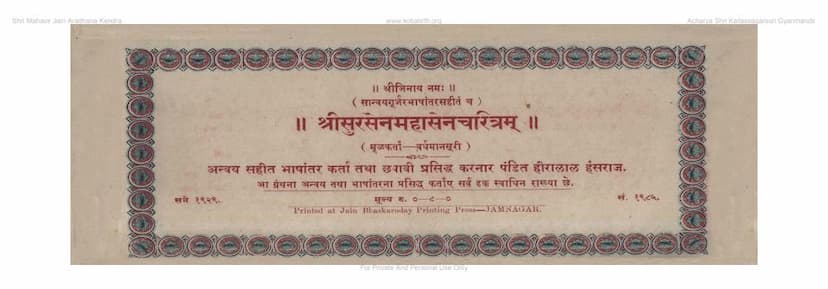Sursen Mahasen Charitram
Added to library: September 2, 2025

Summary
Here's a comprehensive summary of the Jain text "Sursen Mahasen Charitram" by Vardhamansuri, based on the provided pages:
Book Title: Sursen Mahasen Charitram Author: Vardhamansuri Publisher: Shravak Hiralal Hansraj Catalog Link: https://jainqq.org/explore/020775/1
Overall Purpose: The text is a Jain narrative that illustrates the importance of renouncing "Anarthadanda" (unprofitable or harmful actions/vows) as the third of the "Guna Vratas" (virtuous vows). It uses the story of two princes, Sursen and Mahasen, to demonstrate the consequences of such actions and the benefits of adhering to righteous conduct.
Key Narrative and Themes:
-
The Setting: The story begins in the prosperous city of Bandhura, ruled by King Virasen, who is described as a virtuous and powerful king. He has two noble sons, Sursen and Mahasen, who are praised for their physical beauty, virtuous conduct, and exemplary companionship.
-
The Inciting Incident - Mahasen's Affliction: One day, Mahasen develops a sudden, severe, and unbearable swelling on his tongue. Despite various treatments from physicians, the swelling worsens, likened to the growth of greed.
-
The Physicians' Despair and Abandonment: The physicians, unable to cure Mahasen, conclude that only divine intervention or Dharma (righteousness) can help. They abandon him, comparing their action to a prostitute discarding a penniless lover.
-
Mahasen's Deterioration: Mahasen's condition worsens, his tongue becomes infected and emits a foul odor, attracting swarms of flies. The stench becomes so unbearable that even his wife and parents abandon him.
-
Sursen's Brotherly Devotion and Dharma's Power: Witnessing his brother's suffering and the surrounding stench, Sursen, driven by brotherly love, overcomes his aversion to the smell and stays by Mahasen's side. He vows not to eat until his brother is better and even resolves to fast unto death if Mahasen dies.
-
The Miraculous Cure through Dharma: Sursen begins to gently cleanse Mahasen's tongue with purified water, chanting the "Namokar Mantra." Through this act of devotion and the power of Dharma, Mahasen's tongue begins to heal. The swelling subsides, the pain vanishes, and the foul odor is replaced by a pleasant fragrance. The text highlights this as a demonstration of Dharma's immense power, superior to any earthly medicine or remedy.
-
The Revelation of Past Lives (Jati Smaran): Upon recovering, Sursen and Mahasen recall their past lives through "Jati Smaran Jnana" (knowledge of past lives). They learn that Mahasen's ailment was a consequence of his harsh words in a past life when he spoke about punishing a serpent that had bitten a Muni (ascetic). Sursen, in that past life, had spoken out against this, his words being interpreted as the root of the subsequent "sin."
-
The Serpent's Story and Rebirth: The serpent that bit the Muni in the past life is revealed to have been a powerful warrior named Madan. Madan had two sons, Dheer and Veer. Madan's downfall came when he uttered harsh words against a saint who was bitten by a venomous snake. This act of speaking ill of righteous people led to his suffering and subsequent rebirths.
-
The Princes' Renunciation and Liberation: Understanding their past actions and their karmic consequences, Sursen and Mahasen are filled with detachment. They embrace the vows of a renunciate (take Diksha) and, through their virtuous conduct, attain liberation (Moksha).
-
The Moral of the Story: The narrative concludes by urging readers to abandon "Anarthadanda" (unprofitable or harmful actions), as exemplified by the suffering of Mahasen. The story of Sursen and Mahasen serves as a powerful lesson on the far-reaching consequences of one's words and actions and the ultimate efficacy of Dharma in overcoming suffering and achieving spiritual progress.
Key Jain Concepts Highlighted:
- Anarthadanda Viraman Vrata: The third Guna Vrata, which involves abstaining from actions that are ultimately harmful or unprofitable.
- Dharma: Righteousness, moral duty, and spiritual practice, shown to be a potent force for healing and spiritual advancement.
- Jati Smaran Jnana: The recollecting of past lives, a crucial element in understanding karmic connections and consequences.
- Karma: The law of cause and effect, where past actions determine present circumstances.
- Namokar Mantra: The central mantra in Jainism, believed to possess immense spiritual power.
- Diksha: The act of renouncing worldly life to pursue spiritual goals.
- Moksha: Liberation from the cycle of birth and death.
This summary covers the main plot points, character arcs, and the underlying spiritual message of the "Sursen Mahasen Charitram."